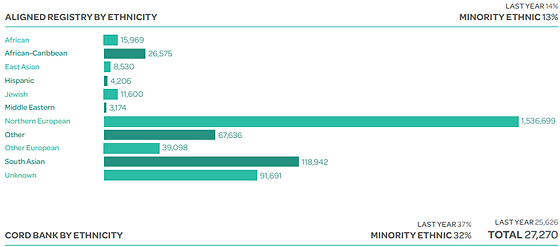
Ethnic Minorities
What do we mean by an ethnic minority?
An ethnic minority is a group of people who differ in race or colour or in national, religious, or cultural origin often from the majority population of the country in which they live.
Of the estimated 56.1 million people in the UK according to the 2011 Census, Asians made up 4,213,531 million or 7.5%, whilst Middle Easterners stood at 230,600 or 0.4% of the population.
Why are they important?
If someone needs a stem cell transplant, their donor needs to be a genetic match for them. Usually that means they’ll need to come from the same ethnic background.
So if you come from an ethnic minority in the UK, or you’re mixed-race, there will be a much smaller pool of potential matches to choose from. That makes it far less likely that we’ll be able to find you a lifesaving match.
Overall, patients from a black, Asian, or minority ethnic background have under a 20% chance of finding the best possible match.
When a patient's own cells are inappropriate for their treatment or where there is no matching sibling donor available, the patient's only chance is to find an unrelated donor whose tissue type, also referred to as their Human Leukocyte Antigen (HLA) type, matches sufficiently.
Underrepresentation on the bone marrow stem cell registry
According to the State of the Registry 2019 - 2020, the number of potential blood stem cell donors now stands at 1.9 million.
However, donors from minority ethnic backgrounds currently make up just 13% of the aligned registry.

People from minority ethnic backgrounds have just a 20% chance of finding the best possible stem cell donor match, compared to 69% from a northern European background.



